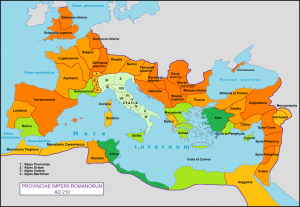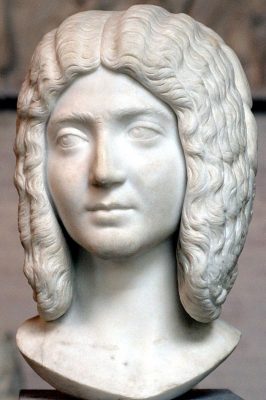Severus rose through politics with the help of influential friends and family and seized power in a time that was filled with chaos and pretenders to the throne. He was declared a god by the Roman Senate and was widely regarded as a strong leader in the years after his death.
Early Life
Lucius Septimius Severus was born in modern-day Libya, in the year 145. He was raised by a wealthy and influential family whose members held important positions in the Roman government. His father, Publius Septimius Geta, was an equestrian and his mother was of Italian-Roman ancestry. Severus enjoyed a good education and learned to speak Latin, Carthaginian, and Greek. As a teenager, he learned the art of oratory but spoke rarely in public as an emperor. When he was 19, Severus headed to Rome to seek a political career, and with the help of well-connected family members, he was able to enter the Senate. There, he acted as a magistrate in charge of the repair of all roads in Rome. However, he was too young to qualify as a state treasurer, so he headed back to North Africa.
Political Career
Severus returned to Rome when he was old enough to qualify as a quaestor and proceeded to manage the state treasury. When the Antonine Plague came down on Rome, it claimed as many as 2,000 people a day and killed several senators as well. Severus benefited from this, and he advanced swiftly through the ranks of the Senate.
In 175, Severus married Paccia Marciana, who was also a native of North Africa. Marciana died in 186, and Severus found a new wife in 187, named Julia Domna. Julia, whose father was a priest of the sun god, Elagabal, was from a wealthy family in modern-day Syria. Severus and Julia had two sons, Lucius Septimius Bassianus (to be known as Caracalla) and Publius Septimius Geta.
The Five Emperors
In 191, Emperor Commodus was descending swiftly into madness and was killed by an assassin through strangulation. Severus was, at that time, governor in Pannonia Superior, having been appointed to the position by Commodus. The slain Commodus was replaced by Pertinax, who was also killed after ruling for just three months. The Praetorian guard declared that the throne would be given to the highest bidder, which Didius Julianus successfully bought for 20,000 sesterces.
Julianus became so unpopular with the public that three contenders postured to take it from him: Pescenius Niger in Syria, Clodius Albanus in Britain, and Severus in Pannonia. Severus soon assembled a substantial army and was ready to storm Rome. More supporters joined Severus on his way to the city, and this frightened Julianus’s supporters, prompting them to leave the unpopular emperor. Severus marched into Rome unchallenged and was proclaimed emperor, while Julianus was killed upon the order of the Senate.
Rule as Emperor
The new emperor ordered Pertinax’s assassins to be executed, then offered Albinus to be his second-in-command. This pacified Albinus, and Severus went on to crush Niger in 194. Afterward, Severus proclaimed his son, Caracalla, as his heir. This enraged Albinus and he again rose, along with his supporters. Severus eventually faced Albinus in the Battle of Lugdunum in 197. Both men were backed by around 75,000 soldiers each, and both lost tens of thousands of them in the bloody clash. Severus eventually defeated Albinus and became the sole, undisputed emperor.
Accomplishments
Severus increased the soldiers’ salaries from 300 to 400 denarii. He also allowed soldiers to marry, which up to that point, was prohibited. Both of these gained the approval of the military, and only showed that Severus gave good advice to his sons when he told them at his deathbed to “be good to one another, enrich the soldiers, and damn the rest.”
Severus also dissolved the Praetorian Guard, most likely because he disdained how easily it installs and murders emperors. The auctioning off of the throne to the highest bidder left the unit with an unappealing image to the public.

After a successful campaign against the Parthians, Severus added their territory to the empire, expanding it to 1.9 million square miles. He then built more reinforcements and fortifications in the Arabian Desert to prevent further rebellions by the Parthians. Upon his return to Rome, he ordered the construction of an arch, the Arch of Septimius Severus, that would commemorate his triumph over the Parthians.
Death
In 208, Severus embarked on a campaign to conquer Caledonia. This would turn out to be his last military expedition, as he died during this campaign in Eboracum, modern-day York.
Severus was given the status of a god by the Senate. There was no indication that he was strongly disliked by the public, and he was widely thought of as an able emperor. His two sons ruled as joint emperors after his death.

